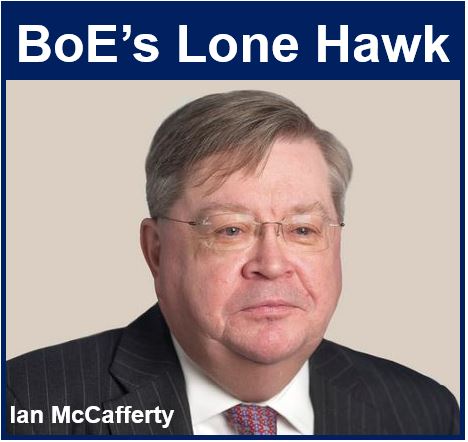The Monetary Policy Committee of the BoE (Bank of England) voted by a majority of 8-1 to maintain the Bank Rate at 0.5%, a decision that helped push up the FTSE, Britain’s top share index.
The FTSE outperformed other major European stock indexes. By midday, the blue-chip FTSE 100 index had risen by 0.5% to 6,363.02 points, compared to Germany’s DAX which rose by just 0.1%, and the pan-European FTSEurofirst 300, which remained unchanged.
According to a BoE statement today, it appears that the majority of the MPC (Monetary Policy Committee) members are in no hurry to raise rates. They voted unanimously to maintain the stock of bought assets financed by the issuance of central bank reserves at £375 billion.
 Ian McCafferty is the only MPC member who wants the Bank Rate to rise. He has often expressed concern that rate rises will need to be abrupt if they don’t start now, which is not good for business and consumer confidence. He is in favour of ‘limited and gradual’ rate rises.
Ian McCafferty is the only MPC member who wants the Bank Rate to rise. He has often expressed concern that rate rises will need to be abrupt if they don’t start now, which is not good for business and consumer confidence. He is in favour of ‘limited and gradual’ rate rises.
The 12-month CPI inflation was 0% in August 2015, considerably below the 2% target rate. Most of that deviation reflects the unusually low contributions from food, energy and other imported goods prices, the BoE informed, as well as the past weakness of domestic cost growth.
BoE votes to try to boost inflation
The BoE added in a statement today:
“Although rising, increases in labour costs remain lower than would be consistent with meeting the inflation target in the medium term, were they to persist at current rates. Core inflation remains subdued at around 1%, influenced both by restrained labour cost growth and by muted import cost growth, itself partly reflecting the continuing dampening influence of sterling’s appreciation since mid-2013.
With inflation well below the target, and the likelihood that some spare capacity will remain in the economy, the MPC wants to set monetary policy in order to make sure that growth is enough to absorb the remaining underutilized resources.
Britain’s central bank predicts that its 2% inflation target will be reached within the next two years.
British investors happy
There was some relief in the City (London’s financial district) that the MPC is in no hurry to hike rates. The British stock market, experts say, is also getting a boost from some commodity stocks.
The rise in oil prices helped push up British oil & gas index by 0.4%, while the mining index rose by 0.8%.
Regarding the eventual increase in rates, the BoE said:
“All (MPC) members agreed that the likely persistence of the headwinds restraining economic growth following the financial crisis means that, when Bank Rate does begin to rise, it is expected to do so more gradually and to a lower level than in recent cycles. Such guidance, however, is an expectation and not a promise: the path that Bank Rate will actually follow over the next few years will depend on economic circumstances.”
How did they vote?
The MPC voted as follows regarding the Governor’s proposition that the Bank Rate should be maintained at 0.5%:
In favour: Mark Carney (The Governor), Ben Broadbent, Jon Cunliffe, Nemat Shafik, Kristin Forbes, Andrew Haldane, Gertjan Vlieghe and Martin Weale.
Against: Ian McCafferty. He preferred to increase the Bank Rate by 25 basis points.

